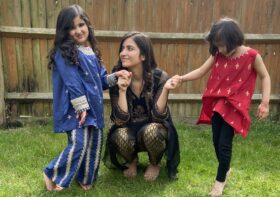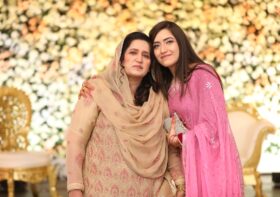Stepping outside the box!

I grew up in a middle-class, traditional family in Pakistan where gender roles were strictly defined. Most decisions were made by the family’s male head, the oldest male in the house, which in my case was my father. Every choice in a girl’s life was weighed against whether her hypothetical, future husband would approve of it. There were no subtle hints; what women should and shouldn’t do was said in plain words. It was normal for us; that’s just how society operated for as long as everyone could remember.
People knew education provided a way to build a career while contributing to society and gaining financial freedom. But a girl’s education was usually perceived as a back-up in case her marriage didn’t work out or her husband somehow became incapable of caring for her.
The list of what women could become was very limited yet what women were expected to be was quite extensive. How a woman should act, from the way she spoke to how she walked, was strictly defined. Women were expected to stay indoors, be homemakers, and have no career ambitions. However, if a girl was to have a career then respectable choices included teacher or doctor, though being a teacher was preferred as it offered shorter work hours, allowing her to get home early to care for her family.
I loved mathematics and physics in school but when I tossed up the idea of becoming an engineer, the request was received with some discouragement by my father as it was considered a career more suitable for men. My older sister studied psychology but she wanted to change her field to software engineering. So, she convinced our father that being a software engineer was best because, “you can work from home.” From my dad’s perspective, staying at home was a golden opportunity as it meant more time to care for a future family. She must have made a solid argument as my dad was so convinced that he almost pressured me to study software engineering as well. I wanted to learn mechanical engineering but I saw his suggestion as a good compromise as it was still the field of engineering. I must admit that this decision was probably the biggest blessing in disguise as I really enjoyed studying and working as a software engineer. And my career in the field of technology grew in ways that I never could have imagined.
In Pakistani society, arranged marriage was the norm and boy’s mothers searched for suitable girls for their sons based on the girl’s appearance, cultural compliance, and ability to do house chores. Suitor’s families started approaching my parents, asking for my hand in marriage once I turned 18. My first question was whether a suitor’s family would allow me to study and pursue a career after marriage. Sometimes my mother was afraid to even ask the question to a potential suitor’s family, thinking her daughter might come across as too driven. Finding my own partner wasn’t frowned upon by my family, though it still is in most parts of Pakistan, but the standards of how a woman should act in society still applied. I didn’t have anything against arranged marriage but I knew I wanted to be more than just a wife. I wanted freedom to study, build a career that I could be proud of, make my own decisions, and have financial freedom. My parents were supportive of my ambitions to a point, so long as I didn’t challenge societal standards too much.
I put all my energies into my studies, knowing from a very young age that a solid academic record was a very reliable way to build a good career in Pakistan. Years later, after travelling and learning about different cultures, I realised that taking education seriously at a young age is a reliable way of building a good career for anyone.
I went to school, college, and university in Pakistan, graduating with honours from one of the best universities there. I made a deal with my parents when I was very young that they would let me study abroad for a master’s degree. When the time actually came for me to pursue higher education, our family’s financial situation was not strong enough for my parents to afford my studies abroad. My parents had savings but, in our culture, funds are saved for girls’ dowries, not necessarily for their education.
Being good at studies came quite handy as I received a very generous scholarship to study in Germany and another one to study in the UK. My father didn’t agree with me furthering my education in Germany, but because I had some family living in the UK, I was allowed to earn my master’s degree there. My parents believed they were granting my last wish by allowing me to study abroad before they married me off. In their minds, working abroad beyond my one-year master’s program wasn’t really an option. Firstly, in our culture a woman living abroad without a male family member, such as a husband or father, is highly frowned upon so they didn’t expect I would even plan to stay beyond a year. Secondly, the UK’s job market is highly competitive for international students who require a visa to remain there beyond studies.
Because I had different plans from my parents, I upskilled myself and looked for jobs in the first few months of starting my master’s degree. Almost everyone told me gaining employment as an international student was nearly impossible but I didn’t take any of the naysayers seriously. I knew if there was a possibility, then I could make it happen. I was relentless; I worked part-time and studied for my degree while applying for jobs with a few of the best companies in the UK. My hard work and determination paid off as I found employment with one of the best technology-consulting companies in London.
When I got a job and told my parents I wanted to stay abroad, they were less than happy since that choice was considered taboo. I convinced my father to allow me to stay by saying that he could consider my job an internship abroad which could end whenever he wanted me to finish. He allowed me to stay for six months but, when those six months passed, I asked for another six months. It wasn’t until the end of second year of employment in the UK that he really accepted that I intended to continue working abroad for the long term.
Within a few years I became very successful in my career, getting promotions at work, once if not twice every year, and was invited on multiple forums to talk about my career journey. Although I started my career without much money, my life became prosperous and full of adventurous travels.
That was the journey of how I went after my dream of building a career and made it a reality. When I was younger, I used to naively think that everything would feel great after I had realised my dream but in reality, it didn’t. Despite being accomplished, I had this nagging feeling that I was not ‘good enough.’ Deep down, I felt guilty for disappointing my parents by not meeting their expectations. I felt guilty for being more ambitious than what was expected of me, for not being married by a certain age, and for living abroad on my own against Pakistani cultural norms. And those nagging feelings of guilt and ‘not-enoughness’ took me on a path of an internal transformation that totally changed my view of my place in the world.
When I first came abroad, I met people from all around the world. I made friends very quickly and grew close to people who came from different cultures. I loved talking about ideas, cultures, and belief systems. I even asked strangers I met on buses about their culture and belief systems. All these conversations expanded my perspective of life and made me realise that we all are by-products of the environments we grow up in.
I didn’t take my society’s standards of women marrying by a certain age or being a dedicated housewife too seriously. However, I unconsciously did take on some of my culture’s beliefs of women’s role in the world which caused me to feel guilty for being ambitious and driven. I also felt like an imposter in my technology career for a long time. In my career interactions, I felt the need to prove myself twice as talented and knowledgeable as the men in my field, in order to be taken seriously.
Slowly but surely, that perception changed as I found some great mentors and role models. I started accepting myself by changing the narrative around my personality traits. For example, I used to think of myself as a jack-of-all-trades but I saw that trait as a weakness before a mentor called the same quality the ‘dynamic-ness’ of my personality. I used to be overly-assertive, thinking I wouldn’t be taken seriously if I wasn’t bold or commanding. But then, I saw some great role models getting their point across in a very soft tone. Their strategy helped me value and develop my own natural leadership skills based on compassion and strategic assertiveness. As I expanded my network, I heard other women talking about feeling like an imposter which helped me to recognise that belief within me as well.
While I became more accepting of myself, I also explored different cultures through my international friends and travelling. I always made friends easily and loved learning about their childhood, cultures, religion, and value systems. The more I learned about the lives of people from different backgrounds, the more I realised that every person’s belief system and behaviour was formed by where they were raised. This awareness was a huge ‘aha’ moment as I saw all my mental limitations to be the outcome of the environment I grew up in. The more I reflected on that understanding, the more I saw all my thoughts and behaviours as an outcome of my cultural conditioning.
I realised that even though I was ambitious and wanted to build a great career, what I was really looking for was freedom from the limiting belief system that put women in a box. And understanding that the freedom I always yearned for had always existed within me was a liberating feeling. My perspective of culture, values, and belief systems changed as I realised that I had the choice to pick my own values and live by them. I found this new treasure which only grows by sharing. I talked about my new-found understanding with anyone I met from that moment onwards and helped them see their own limiting mental patterns, as well.
From that point in my life, I re-thought my values every single day. It wasn’t the process of bitterly rejecting my old values, instead, it was a conscious evaluation to improve my way of thinking and figuring out what works the best for me.
I also worked on my relationship with my traditional Pakistani parents who I loved so dearly. As I grew mature, I started to separate myself from their expectations of who I should have been and this helped me let go of my guilt about disappointing them. I tried to communicate what is important to me. Sometimes they accepted my view and other times they shut me down, but every time our connection became stronger. Having a healthier relationship with my parents manifested as a better self-image in my life. I still work to improve my relationship with all my family members and friends from Pakistani culture.
As I reflect back on my life, I recognise key lessons for every person which include:
- Value education: Education doesn’t mean just the traditional way of learning via school, college, and university but also discovering different ways of living and thinking. New lessons in life open our mind to seeing the world in different ways. Learning new perspectives alters every aspect of our lives so that we don’t just allow circumstances to change us, we are able to change our circumstances.
- Honour your dreams: If we have a dream to become or achieve something in life, then we must honour it. We shouldn’t wait for anyone’s permission to go after our dreams. Sometimes it takes longer than expected but any delay or setback should not get in the way of us continuing to work for our dreams.
- Live your purpose: We all have our own unique gifts, including personality traits and talents. I didn’t realise until I turned 28 years old that my purpose is just another name for my natural gifts; being a people-person, a compassionate leader, someone who is logical and intuitive, and a great communicator. I can use these talents to be an author, a technologist, a speaker, a teacher, or anything I aspire to be.
- Choose empowering beliefs: Our beliefs can cage us or set us free. Most of us inherit our beliefs from the environment we grow up in. The first step in choosing empowering beliefs is to recognise them. We can discern our limiting beliefs by noticing what we believe is possible. And we can consciously adopt more empowering beliefs by finding role-models who we want to be like and figure out how they think.
- Value progress over speed: For most of my life, I blamed myself for not being ‘there,’ not achieving more than I had. Yet, I learned that there is no real destination to aim for, as the joy is in what you are learning and becoming as a person. I have come to realise that moving ahead is more important than how fast we are going.
Beyond all these values, the most important lesson for me was to take life easy and be kind to myself. With absolute faith, I recognise that everything eventually works out.
You can find the full book on amazon.



Rabia
Lovely Rabia! A heart touching story from one soul to another.
RabiasNotes
Thank you, from one Rabia to another! 😉
iqra
you are so pretty mashallah 🥰 and this article is the best thing I read today
roo
Love this! contact she speaks we hear with it
Jam Hojas
Such an inspiring read Rabi! Keep pushing yourself and keep being awesome! I continue to applaud you, your triumphs, your success, and everything in between here from the Philippines <3! – Jam
adnan
some problems are comoon in girls and boys life in midle clas families..
you worked hard and you succeeded
Maria
Enjoyed reading it thoroughly. I know you enough to say that i’m so proud of you and continue being this happy chirp that you are.
Osama Hafeez
I just read it .. loved it ..
This relates to most young women in Pakistan.
Mothers and mother in laws have to play a vital role in acknowledging the true potential of their daughters .. and see them beyond kitchen ..
The dalima is 50 % of our workforce does not contribute towards our GDP ..
Wonders can be achieved if we start empowering our females, starting from our own house .
Tayyaba
A relatable story for every Pakistani girl. Loved reading it!! Prayers for your future.